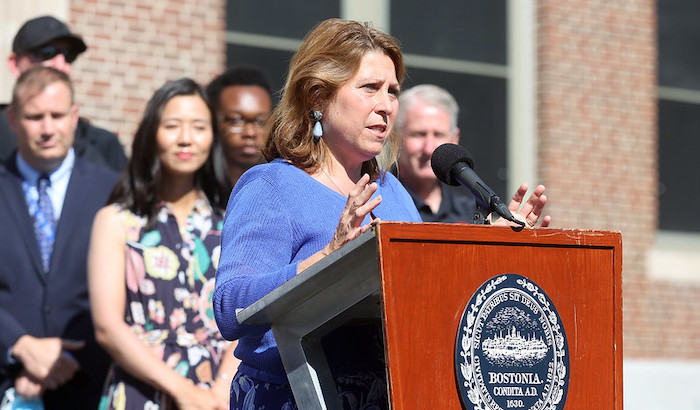
Yes, our student reporter asked about school lunches, and even got an answer
With the passage of Mayor Michelle Wu’s Green New Deal and the approval of Mary Skipper as the new Boston Public Schools superintendent, it’s clear that education is a focus for the city as it recovers from the pandemic. With new faces in leadership, a transition period could catalyze long-term and sustained growth.
For years, Boston’s schools have faced issues with drugs, dropout rates, and low test scores. Superintendents have stepped up to structurally reform the system, but few have stayed in their position for long enough to see lasting change. BPS records show that since 2013, no superintendent has remained in office for more than three years.
With the resignation of Superintendent Brenda Cassellius and Skipper coming on, there is an opportunity to address issues head on—issues like those which came up when I questioned my peers about the district’s needs while the selection process was still underway. As one student said, “I feel that BPS as a whole … needs to be more curated for the students; there are a lot of schools with different environments which need different sets of policies.”
I recently interviewed the new superintendent to ask about Boston’s future, her plans, and the problems facing Boston youth, including those which were noted to me by my fellow students.
Skipper was announced as the new superintendent in early July following a lengthy interview and months-long selection process (there was also criticism from some who argued the process was rushed). She boasts an impressive background, from studying classics at Tufts, to learning about education at Harvard, and finally studying urban education leadership at Columbia. Her previous role was as superintendent of Somerville Public Schools, but she always had a clear affinity for Boston. From raising her family here to becoming network superintendent for BPS, she explained that “at each step, Boston, BPS, and the colleagues that were around me raised me.” The true value of education, she said, “was not the place, the material, or the content, but the people.”
“Whether it was a fellow student, advisor, or professor, I saw it as an opportunity to learn,” Skipper told the Dig.
As superintendent, Skipper said she has a simple and ambitious agenda to focus on “really rigorous sound academics, mental health, access to support and resources, job opportunities, linkage of learning to jobs, and apply[ing] what you learn in a very practical way.”
One key issue that Skipper will have to address is school food, as many students are adamant that the topic is too often left out of policy discussions. Students I spoke with also said they feel disconnected from administrators. Asked about the latter, Skipper said she understands, and didn’t know her own superintendent back when she was a student. “The nature of schools is that schools are very intimate,” she said.
While she may not have known her superintendent, Skipper said she does “remember [her] principals and teachers” who fostered an enriching atmosphere. As for how students can get to know her, the new head of schools said “she would welcome working with a cabinet of students.” Such a body could play a pivotal role in bridging the gap between students and administration and provide direct communication for those who need it.
Another key concern noted by Boston students was the general state of the buildings; people are concerned about failing infrastructure in particular. In one example, a Boston Latin Academy student said, “due to gas leaks from pipes for the last couple months, teachers around the building haven’t been able to have their own classrooms and occasionally there are parts of the campus that’s concerning.”
Skipper said that the alignment between Wu and herself will create lasting change. She described the mayor’s Green New Deal as a “promise, kind of almost a guarantee that we are assuring much better buildings… buildings that have the quality to be educated in.” In just four years, the program is expected to bring more than 14 major renovation projects to the city that will impact thousands of students.
As for the all-important issue of food … If you’ve been to a BPS school, you will hear students comment on the “cardboard” pizza, “squishy and soft” sides, and the occasionally overly-sweet chicken. The quality is subpar at best. Skipper understands this and voices the concerns loudly; she explained that similar to progress with the Green New Deal, the city has committed to partnering with a new local vendor which will serve as a monumental disruption of the status quo.
“City Fresh Foods has been selected and that is going to be our key vendor,” Skipper said. “What’s special about it is that it’s based out of Roxbury, it’s a Black-owned company, a company that is really going to provide culturally-sensitive menus for our students, where there’s input from our students of what is served, food quality will be better, hot meals; the kind of things that students complain about: the sides, the amount. You know, the things that in a standard food service are really hard to deliver. But the advantage with really partnering with a Roxbury-based Black-owned food company is that it says it’s about the community and serving the community. So we are excited about that. We’ve begun some of those meals over the summer and that will be extended into the school year. And that will hold true for all of our Boston Public Schools.”
There’s a lot of work to be done, but Skipper seems to have an open ear when it comes to listening to Boston’s youth. As a student myself, it’s refreshing to see new initiatives and programs. Hopefully the plans are effective, and continue to represent the wishes of students moving forward.
Sam Chen is a junior at Boston Latin School interested in advocating for other students, and learning about economics, education, and state policy.

